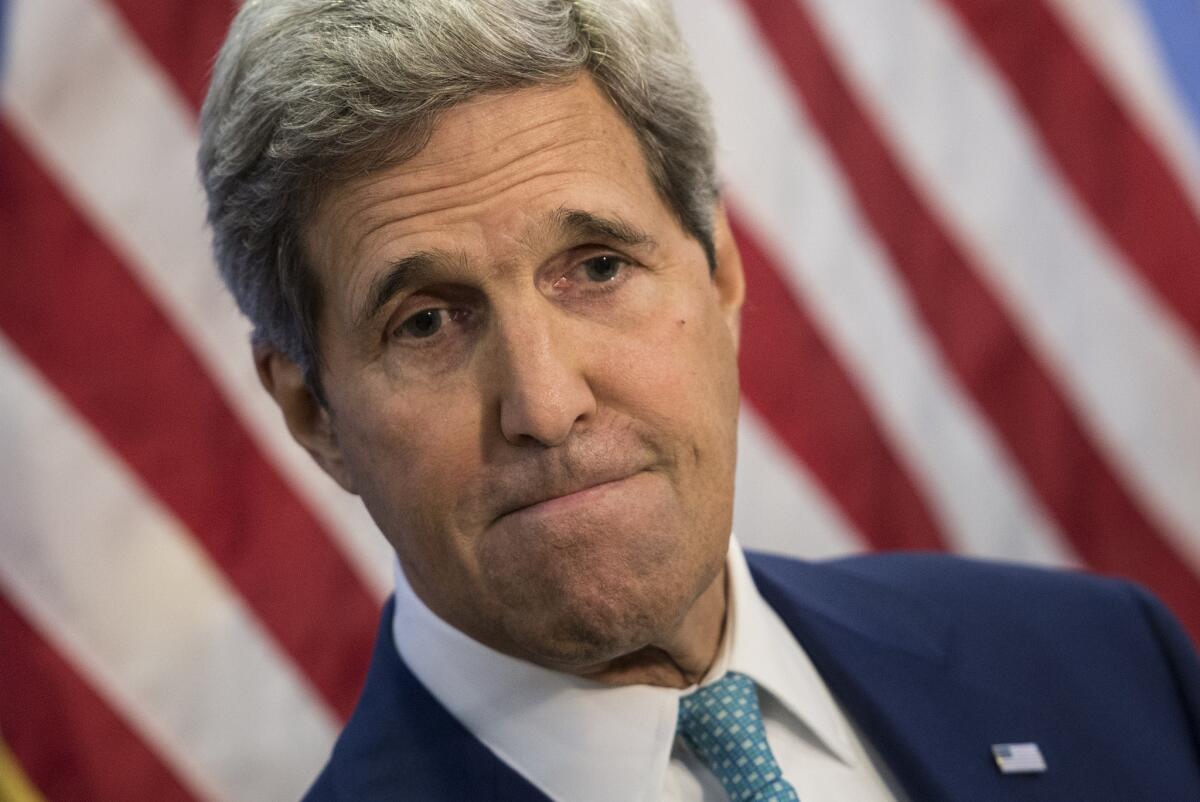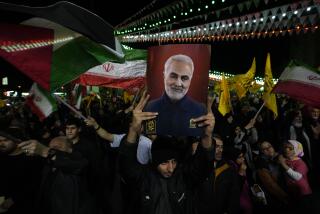‘Not appropriate’ for Iran to join Islamic State talks, Kerry says

U.S. Secretary of State John F. Kerry said Friday that it “would not be appropriate” for Iran to participate in a global security conference scheduled for next week in Paris.
“Under the circumstances, at this moment in time, it would not be right for any number of reasons” for Iran to take part in the session, Kerry told reporters in Ankara, Turkey, where he was trying to mobilize Turkish support for action against Islamic State militants in Syria and Iraq.
The comments were the latest diplomatic fallout from the battle against militants in Iraq, in which Washington and Tehran find themselves fighting on the same side — an odd and sometimes uncomfortable position for two entrenched foes.
The conference in Paris is billed as a forum for global leaders to discuss how to confront the Islamic State, which now controls large swaths of Iraq and Syria. French officials have said they would like Iran to attend.
At the Ankara news conference, however, Kerry called Iran a “state sponsor of terror” and cited the presence of Iranian forces in Syria helping the government of President Bashar Assad.
Iran denies it has combat troops deployed in Syria but acknowledges it has sent military advisors to assist the Syrian government in its battle against rebels. Iran’s close ally, Hezbollah, a Lebanese group, has dispatched militiamen to Syria to fight for Assad’s government.
Tehran rejects allegations that it sponsors terrorism and accuses the United States of backing terrorists in Syria and elsewhere.
The campaign against the Islamic State in Iraq has created a new twist to the long-fraught relationship between Tehran and Washington, which have not had diplomatic relations for more than three decades. Iran is also an archenemy of Saudi Arabia and Israel, Washington’s two major Middle Eastern allies.
But the United States and Iran are now effectively allies in Iraq, although neither broadcasts the fact publicly. Both countries are helping Iraq battle the Islamic State, a Sunni Muslim movement that views Shiite Muslims as apostates. Iran is an overwhelmingly Shiite nation.
Iran, like the United States, has provided military assistance to Iraq, its neighbor. But U.S. officials have stressed that Washington has not coordinated its military activities in Iraq with Iran.
In Syria, however, the United States and Iran are on opposite sides.
Iran is a staunch supporter of Assad, whose forces are fighting numerous rebel factions, including Islamic State militants.
The United States has long aided rebel groups seeking to oust Assad. But this week President Obama declared that U.S. forces may attack militant positions in Syria, signaling that the United States may become directly involved in the Syrian conflict. The president did not say Assad’s forces would be targeted.
Washington has worked hard to exclude Tehran from any public diplomatic efforts to end the Syrian war, now in its fourth year. Earlier this year, intense U.S. objections led to Iran being disinvited from United Nations-sponsored Syrian peace negotiations in Switzerland. Those talks ended without any progress.
Iran is involved in negotiations with world powers including the United States that could result in reduced international economic sanctions against Tehran in exchange for guarantees that the Islamic Republic does not pursue a nuclear weapons program. The nuclear talks face a Nov. 24 deadline.
Follow @mcdneville on Twitter for news from the Middle East
More to Read
Start your day right
Sign up for Essential California for news, features and recommendations from the L.A. Times and beyond in your inbox six days a week.
You may occasionally receive promotional content from the Los Angeles Times.






